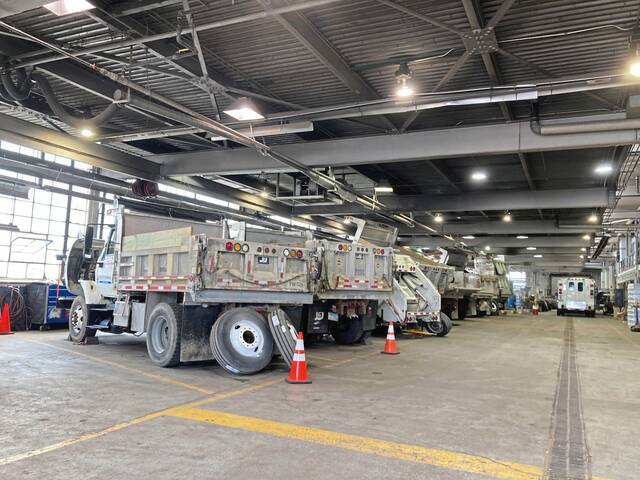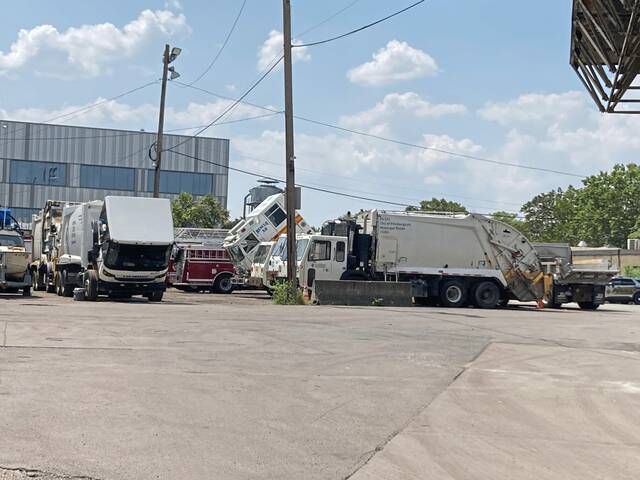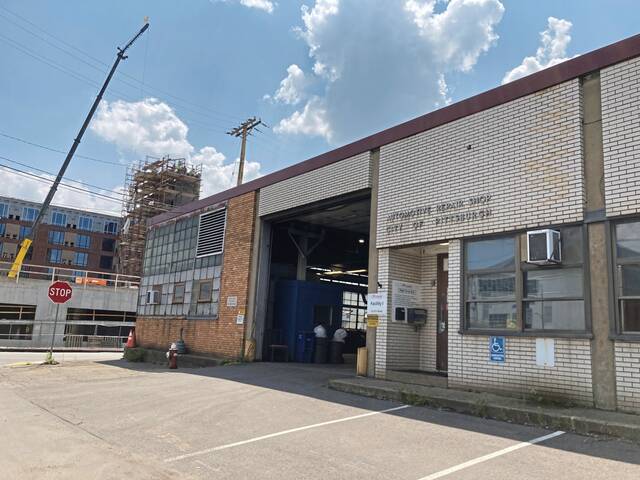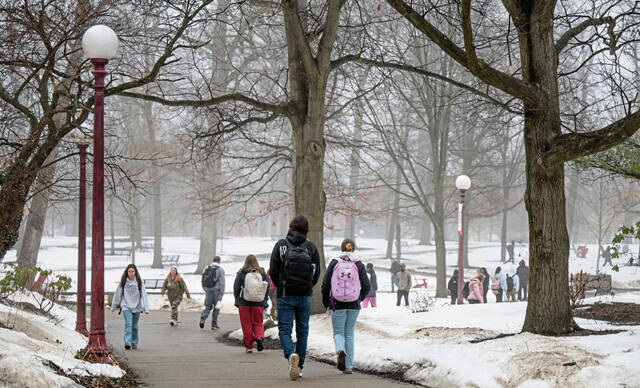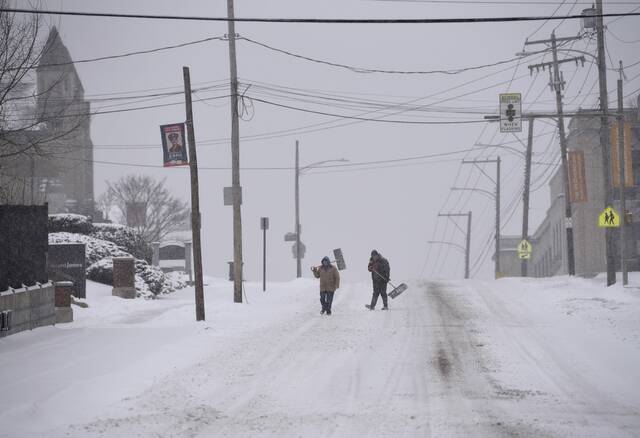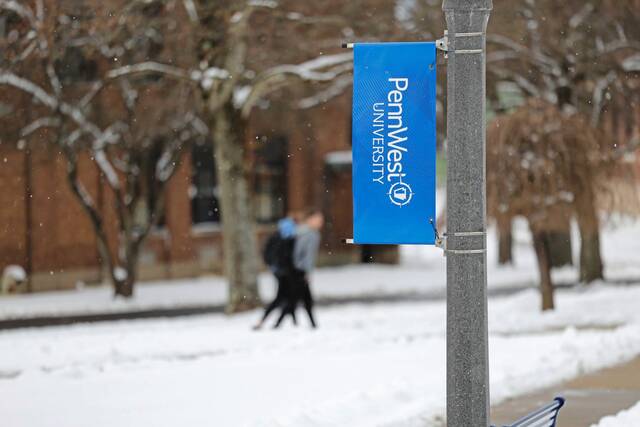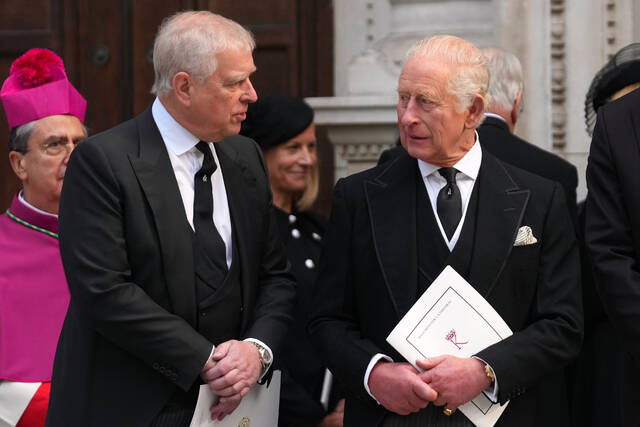On Friday, Pittsburgh Controller Rachael Heisler left her Grant Street office, hopped in her vehicle and took a field trip to the city’s maintenance garage in the Strip District.
She was being blamed for delays in trash collection and wanted to see for herself what all the fuss was about.
The facility’s general manager, Scott Striegal, greeted Heisler. They had a cordial chat and found common ground.
Fleet problems have plagued the city for years. Officials acknowledge that ambulances have broken down with patients en route to the hospital, and snowplows have been out for repairs during winter storms.
“The issue with the fleet is that the fleet is old,” Heisler said.
“It’s almost a daily battle with the fleet,” Striegel replied. “We’re working tomorrow, trying to catch up on refuse.”
A meeting of the minds has not extended to the mayor’s office.
Heisler has refused to pay hundreds of thousands of dollars to Transdev, the Illinois company under contract to maintain Pittsburgh’s rickety ambulances, garbage trucks, police vehicles, snowplows and fire trucks. She said Transdev didn’t provide proper documentation on its invoices.
Mayor Ed Gainey’s office claims the billing dispute has led to extended wait times for repairs to garbage trucks and mounting piles of trash in some parts of the city.
When Heisler arrived at the garage, at least two city garbage trucks were parked inside for repairs with several more waiting outside, alongside fire trucks and a river rescue boat.
Mayoral debates have touched on fleet issues, and City Council members have pondered how the city could find millions more in its budget — which already is stretched thin — to buy new vehicles.
The controversy surrounding the city’s Transdev contract essentially boils down to a question of how the company should be paid for routine maintenance.
It has led to a clash between the Gainey administration and Heisler, an independently elected fiscal watchdog that cuts the checks to the city’s vendors. And it has put a spotlight on the woes of the run-down fleet and a city hamstrung by budgetary pressures.
Reimbursement rate
The contract with Transdev calls for the city to pay a flat monthly rate of nearly $707,000 for routine vehicle maintenance, rather than paying for specific work that has been performed.
The flat rate has routinely been higher than the cost of work Transdev actually does each month, according to information from Heisler’s office.
A key part of the contract calls for Transdev to reimburse Pittsburgh for overpayments on routine maintenance such as oil changes — but at only 80 cents on the dollar.
According to Heisler, this arrangement is allowing Transdev to pocket between $10,000 and $18,000 each month so far this year— over and above the fee it already charges the city. Those figures represent 20% of the city’s monthly overpayments between January and June.
Heisler believes the city should pay only for work that has been completed and documented in detailed invoices. She has paid Transdev so far only for work that was completed and invoiced. The difference between that and the flat rate totals about $405,000 that Transdev says the city still owes.
The Gainey administration, however, thinks the city should pay the flat rate and accept the 80% reimbursement on overpayments.
Heisler sought an opinion from the city’s law department about what to do. It advised her to pay the bill.
‘Ludicrous’ system
Despite its advice, the legal opinion said Heisler’s basis for paying the smaller, invoiced amounts was reasonable. City lawyers wrote that the contract language leaves “substantial room for interpretation.”
The law department, along with Heisler, suggested council amend the contract language to clear up further confusion.
Heisler sent a letter to council members last week urging them to prohibit future contracts with language similar to Transdev’s.
“Taxpayers should never be billed for services they didn’t receive,” Heisler wrote. “We must distinguish between true operational savings and simply delivering what was promised. If the work didn’t happen, the City should not be invoiced as if it did.”
Councilman Bob Charland, D-South Side, said the contract’s payment system seemed “ludicrous.”
“I’m not sure if the contract is being followed the way it was supposed to be, but I am sure the controller’s doing her job by making sure we’re spending tax dollars appropriately,” he said.
Councilman Anthony Coghill, D-Beechview, said it seemed unusual that the city allowed Transdev to keep a portion of overpayments.
“I feel like we’re throwing 20% away,” he said.
Jake Pawlak, the city’s director of the Office of Management and Budget, defended the contract.
“We are ultimately made whole in the sense that we never pay for services that are not rendered,” he said.
Pawlak said he believed Transdev would charge more for the same repairs if the city only paid for work after it was completed. He could not provide estimates of what Transdev might charge under a different payment plan.
“They agreed to the pricing we got now based on this agreement, which provides the kind of cash flow they need to run the garage effectively,” Pawlak said, adding a different payment structure “would likely result in us getting higher prices.”
Heisler told TribLive she believed that line of reasoning “seems quite speculative.”
Credit dispute
When there are larger repairs beyond routine maintenance, the city pays only for work that has already been completed and listed on detailed invoices.
Councilwoman Barb Warwick, D-Greenfield, said she sees both sides of the issue.
“On the one hand, we have to pay our bills,” she said. “And we also need to make sure we have a contract — especially contracts of that size — where we can clearly see the individual services we’re paying for.”
Under the contract, the city is authorized to spend nearly $8.5 million for routine maintenance this year, plus nearly $3.7 million for more serious repairs.
The city has worked with Transdev — formerly called First Vehicle — for about two decades. Though a new contract was inked under Gainey, the payment mechanism predates his administration.
In 2013 and 2014, it seems the payment structure saved the city money, as the vendor completed work that totaled more than the flat monthly fee in those years. They did not bill the city for that extra work.
Pawlak told TribLive he anticipates Transdev will reimburse the city nearly $700,000 this year — the 20% reimbursement of its overpayments.
But Transdev is withholding that credit until it gets the $405,000 it says it’s owed by the city for the first half of this year. So even Transdev ultimately owes the city about $300,000, it’s not paying until it gets its money.
Pawlak said the city is relying on the $700,00 — about the same annual amount as in recent years — to cover additional repairs for the rest of 2025.
That includes expedited work on garbage trucks, he said.
An unusually large number of garbage trucks have been out of service in recent weeks, leading to delays in garbage pickup, according to Pawlak.
Because refuse vehicles are in service every day, he explained, when one needs maintenance, officials sometimes pay more to bring in additional crews to repair it overnight.
That has not been happening because of the payment dispute, Pawlak said, though officials said contracted maintenance has continued as usual.
On Friday, Pawlak said, seven garbage trucks were out for maintenance.


